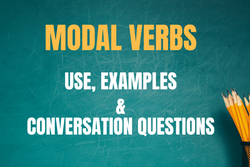Mar 9, 2023
Introduction and Usage of Basic Modal Verbs


"Getting Started with Modal Verbs: Introduction and Usage of Basic Modals in English"
OBJECTIVE:
To teach learners about modal verbs and how to use them correctly in sentences.
Learning Outcomes:
By the end of this lesson, learners will be able to:
1. Define modal verbs and their functions
2. Identify the different types of modal verbs
3. Use modal verbs appropriately in sentences
4. Understand how to use modal verbs to express degrees of possibility, ability, permission, and obligation
5. Differentiate between modal verbs and other auxiliary verbs in English
DEFINITION OF MODAL VERBS
Modal verbs are a type of auxiliary verbs in English that express degrees of possibility, ability, permission, and obligation. They are also used to express advice, suggestions, and warnings. Modal verbs are different from other auxiliary verbs because they do not have a past participle or an -ing form.
The most common modal verbs in English are can, could, may, might, must, shall, should, will, and would.
Modal verbs can also be used in combination with other verbs to form verb phrases, such as "can swim," "must study," or "should have gone."
THE MOST COMMON MODAL VERBS AND THIER FUNCTIONS:
1. Can: expresses ability, possibility, or permission
2. Could: expresses past ability, possibility, or permission; also used to make polite requests
3. May: expresses possibility or permission; also used to make polite requests or give suggestions
4. Might: expresses possibility or uncertainty
5. Must: expresses strong obligation or necessity
6. Shall: expresses future intention or suggestion; also used in formal invitations or offers
7. Should: expresses advice or recommendation
8. Will: expresses future intention or prediction
9. Would: expresses past habit, willingness, or hypothetical situations.
Modal verbs can also be used in combination with other verbs to form verb phrases, such as "can swim," "must study," or "should have gone."
1. Can: expresses ability, possibility, or permission
Examples:
1. I can play the guitar very well.
2. Can you help me carry these boxes to the car?
3. He can speak four languages fluently.
4. We can take the bus or the train to get to the city.
5. Can I leave work early today?
2. "Could" to express past ability, possibility, or permission, as well as to make polite requests.
Examples:
1. When I was younger, I could run a mile in under six minutes.
2. Could you please pass me the salt?
3. She could have been a doctor if she had pursued a medical degree.
4. Could you let me know if the meeting is rescheduled?
5. We could go to the beach tomorrow if the weather is nice.
3. "May" can be used to express possibility, permission, make polite requests, or give suggestions:
Expressing possibility:
1. It may rain later today, so bring an umbrella just in case.
2. She may be able to come to the party if she finishes her work on time.
3. The new restaurant may be really good, but we won't know until we try it.
Expressing permission:
1. May I leave early today? I have an appointment.
2. You may use my computer if you need to finish your project.
3. May I speak with your manager, please?
Making polite requests:
1. May I ask you a question?
2. May I borrow your pen for a moment?
3. May I suggest we start the meeting with a quick review of the agenda?
Giving suggestions:
1. You may want to try the seafood paella, it's their specialty dish.
2. May I suggest that we schedule a follow-up meeting to discuss this further?
3. If you're looking for a good book to read, you may enjoy this new novel by your favorite author.
4. "Might" can be used to express possibility or uncertainty:
Examples:
Possibility:
1. We might be able to finish the project by the end of the week if we work overtime.
2. I might be able to join you for dinner later tonight, but I'm not sure yet.
3. If we leave now, we might catch the last train home.
Uncertainty:
1. I might not be able to attend the meeting tomorrow, as I have some personal matters to attend to.
2. The new product might not be successful in the market, despite all our efforts.
3. It might rain today, but the weather forecast isn't very clear.
Suggestion:
1. We might want to reconsider our approach, as it hasn't been yielding the desired results.
2. You might want to consult a specialist, as this condition might require specialized treatment.
3. She might feel better if she gets some rest, as she has been feeling under the weather lately.
5. "Must" can be used to express strong obligation or necessity:
Examples:
Obligation:
1. You must submit your application before the deadline or you won't be considered for the position.
2. We must follow safety protocols to prevent accidents in the workplace.
3. The employees must attend the training session to comply with company policy.
Necessity:
1. I must finish this report by the end of the day, as it is crucial for the meeting tomorrow.
2. We must address this issue immediately, as it poses a threat to our reputation.
3. You must take your medication regularly to manage your condition effectively.
Prohibition:
1. You must not enter the restricted area without permission, as it is a violation of security protocol.
2. Employees must not disclose confidential information to unauthorized parties, as it is a breach of company policy.
3. You must not smoke in the designated non-smoking areas, as it is against the law.
Recommendation:
1. You must visit your doctor regularly to maintain good health.
2. We must invest in renewable energy sources to reduce our carbon footprint.
3. You must prioritize your work to meet the deadline.
6. "Shall" can be used to express future intention or suggestion and in formal invitations or offers:
Future intention:
1. I shall call you tomorrow to discuss the project further.
2. We shall begin the renovation work next week.
3. She shall complete her degree by the end of the year.
Suggestion:
1. Shall we have a meeting to discuss this issue in detail?
2. You shall try this new restaurant, the food is excellent.
3. Shall I bring you some coffee?
Formal invitations:
1. You are cordially invited to attend our annual gala, which shall be held on the 15th of May.
2. Shall we have the pleasure of your company at dinner this evening?
3. We shall be delighted if you could join us for the opening ceremony of our new branch.
Offers:
1. Shall I assist you with your luggage?
2. We shall be happy to provide you with a discount on your next purchase.
3. Shall we arrange for a taxi to take you to the airport?
7. "Should" : expresses advice or recommendation
Examples:
1. Should - expresses advice or recommendation:
2. You should take a break from work to reduce your stress levels.
3. I think you should apply for that job, it's a great opportunity.
4. We should consider investing in renewable energy to reduce our carbon footprint.
8. "Will" - expresses future intention or prediction:
Examples:
1. I will attend the meeting tomorrow to discuss the project.
2. We will launch our new product next month.
3. She will be a great addition to our team.
9. "Would" - expresses past habit, willingness, or hypothetical situations:
Examples:
1. I would often go to the park to relax after work when I lived in the city.
2. Would you be willing to help me with this project?
3. If I had more time, I would love to travel the world.
SUMMARY
The lesson is about how different modal auxiliary verbs are used in the English language to express different meanings in sentences. "May" and "might" express possibility or permission, "must" expresses strong obligation or necessity, "shall" expresses future intention or suggestion, "should" expresses advice or recommendation, "will" expresses future intention or prediction, and "would" expresses past habit, willingness, or hypothetical situations. Each of these modal auxiliary verbs has specific uses and functions, which can help convey meaning and context in sentences.
CONCLUSION
Understanding how to use modal auxiliary verbs correctly can help improve communication and avoid misunderstandings in different settings, such as professional, academic, or social contexts. Overall, mastering the use of modal auxiliary verbs can enhance one's fluency and proficiency in the English language.
By undefined
14 notes ・ 25 views
English
Beginner